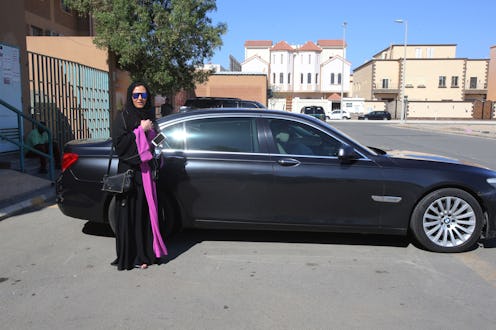News
Saudi Arabia's Women Drivers Ban Is About To End, But Activists Aren't In The Clear Yet

In what people are calling an alarming turn of events, activists are getting arrested right before Saudi Arabia's ban on female drivers is due to be lifted. Many of these activists had fought for women's right to drive in the country for many years — and are now facing detention by the government. While Saudi officials have not commented directly on the arrests, they're sparking concerns that they could be part of an effort to condemn dissent as the country approaches the overturn of its women's driving ban in June.
According to Human Rights Watch, which released a statement on May 18 regarding the arrests, Saudi Arabia has detained several prominent women's rights activists since May 15. These activists include Eman al-Nafjan and Lujain al-Hathloul, both of whom were very involved in the push to end the women's driving ban in Saudi Arabia. Indeed, al-Hathloul was arrested in 2014 after attempting to drive a car into Saudi Arabia from the United Arab Emirates. She was detained for 73 days at a juvenile detention center.
According to Amnesty International, other activists who have been arrested include Aziz al-Yousef, Dr. Aisha al-Manea, Dr. Ibrahim al-Modeimigh, and Mohammad al-Rabea. The Associated Press described al-Yousef and the aforementioned al-Nafjan as "two of the most well-known women's rights activists in the kingdom who for years had campaigned for the right to drive and were involved in human rights issues in the kingdom."
As the Associated Press reported on May 20, Saudi officials have not commented on the activists' arrests. However, as Amnesty International noted, an official statement in the state-run media accused the activists of "posing a threat to state security for their 'contact with foreign entities with the aim of undermining the country’s stability and social fabric.'"
Samah Hadid, Amnesty International’s Middle East Director of Campaigns, characterized the activists' arrests as a "smear campaign." She also condemned Saudi officials for seeking to cultivate a reform-oriented image, saying it does not align with their actions. As Hadid described:
Crown Prince Mohammad Bin Salman has presented himself as a ‘reformer’, but such promises fall flat amid the intensifying crackdown on dissenting voices in the kingdom. His pledges amount to very little if those who fought for the right to drive are now all behind bars for peacefully campaigning for freedom of movement and equality ... Saudi Arabia cannot continue to publicly proclaim support for women’s rights and other reforms, while targeting women human rights defenders
Sarah Leah Whitson, the Middle East Director at Human Rights Watch, echoed similar sentiments in a March 18 statement, saying:
Crown Prince Mohammad bin Salman’s ‘reform campaign’ has been a frenzy of fear for genuine Saudi reformers who dare to advocate publicly for human rights or women’s empowerment ... The message is clear that anyone expressing skepticism about the crown prince’s rights agenda faces time in jail.
As the Associated Press noted, after the Saudi government officially decided to overturn the driving ban back in September of 2017, activists were instructed not to speak with the media about the issue. In turn, much of the credit for the reform went to Crown Prince Mohammed bin Salman, King Salman's 32-year-old son.
This pressure on activists to remain silent falls in line with what some perceive as the impetus behind the ending the ban on women's driving. As the Associated Press noted, overturning the ban serves to bolster the country's economy and global image but is not necessarily inherently rights-oriented. As the outlet pointed out, the country is still an absolute monarchy and women are also still subject to a host of restrictions, including the ultra-conservative male guardianship law.
It remains to be seen whether Saudi Arabia's government will further address the activists' arrests and/or offer insight as to whether they will be released. As Saudi Arabia approaches the expiration of its women's driving ban on June 24. Regardless, you can bet the world will be watching.